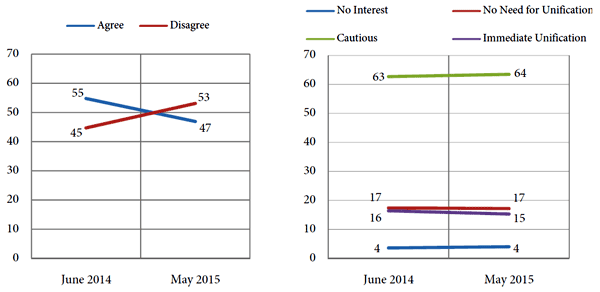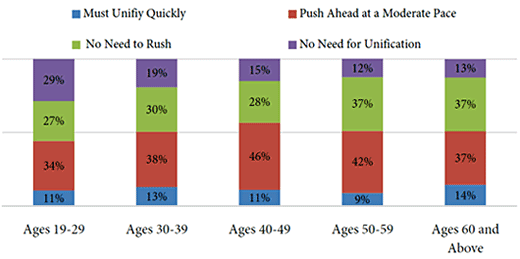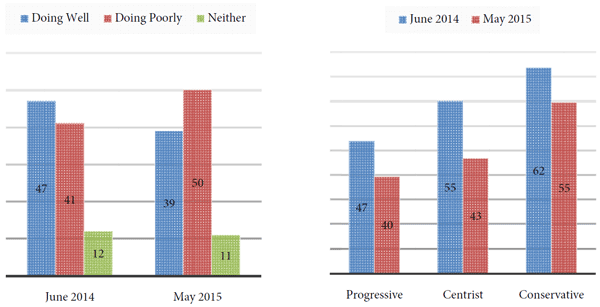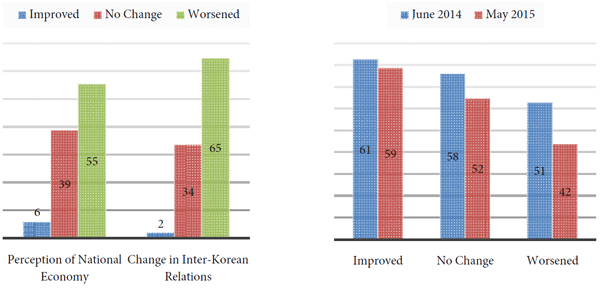![[EAI Opinion Review] The Deterioration of Support for the Unification as a “Bonanza” Idea and a Way to Reignite Momentum](/data/bbs/eng_reports/2015090716361438.jpg)
[EAI Opinion Review] The Deterioration of Support for the Unification as a “Bonanza” Idea and a Way to Reignite Momentum
Others | 2015-09-07
Han Wool Jeong
Multimedia [Smart Q&A: Han Wool Jeong] Public Opinion on President Park’s Unification Policy
[The Public’s Appraisal of the Park Geun-hye Administration’s Unification Policy]
Support for Unification as a “Bonanza” Has Waned; Caution Regarding Unification is Rock Solid
Ways to Reignite Momentum: (1) Improve Inter-Korean Relations (2) People’s Livelihood (3) Go All-in on Suturing the Tear between the Ruling Party and the Administration
|
This report is the original version of a report provided to Media Today and published under the title “Opposition to Unification as a “Bonanza” Idea Leaps from 45% to 53% - The Public’s Appraisal of the Park Geun-hye Administrations North Korea Policy.” This report is published with the consent of Media Today. |
Grading the Park Geun-hye Administration’s Unification Policy at Its Halfway Point
■ Deterioration of Momentum for the Unification as a “Bonanza” Idea: Support of the “Bonanza” Idea Has Decreased; Apprehension towards Unification Remains
■ Those in Their 20s and 30s are also Skeptical
The Park Geun-hye administration has reached the halfway point and is now starting the second half of its term. It is time for the government to practically evaluate the conduct of state affairs during the first half of its term and begin earnestly planning policies for the second half. Hopefully the government is not overlooking the need for an examination and modification of the vision and strategies for matters of state because of the tensions between the ruling party and the administration caused by the conflict over the revision of the National Assembly Act. Considering the currently-strained state of inter-Korean relations and the significance of the 70th anniversary of the division of the Korean Peninsula, the need for the government to evaluate its policy towards North Korea and to examine its strategies for the second half of its term becomes more apparent. This article will look at the government’s unification policy through the eyes of the Korean public as well as diagnose the problems with the Park Geun-hye administration’s unification policy and provide possible solutions.
The Park Geun-hye administration’s unification policy has been coined as the “unification as a jackpot theory” and we can see that the public’s perception of this policy has soured over the last year (see Figure 1). Let us take a look at the results of the public opinion surveys carried out by Hankook Research at the request of EAI during May of 2015 and June of 2014. The concept of unification as a “Bonanza” was announced in January 2014 and Park Geun-hye issued her Dresden Doctrine in March 2014. Following these proclamations, a 55% of Korean’s supported the government’s unification as a “Bonanza” idea. That is to say that the Korean people responded positively to the unprecedented “Bonanza” argument that President Park Geun-hye proposed in January 2014.
However, at the present moment a year later, the percentage of those agreeing with the unification as a “Bonanza” idea has fallen to 47%. And the percentage of people who do not agree with the argument has risen from 45% to 53% over the same time period. Also, the percentage of Korean people with a positive attitude towards unification and agree with the statement “unification should take place as soon as possible” remained a small minority at 16% in 2014 and 15% in 2015. Instead, the majority of people - 63% in 2014 and 64% in 2015 - are more cautious towards unification and agree with the statement, “unification must take place, but we should not hurry” (see Figure 2). From this we can see that the government’s efforts to change the people’s attitude towards unification from passive to active is failing.
It is also no small issue that the younger generations are particularly passive about unification. It a phenomenon was identified in the early 2000s in which the younger the generation, the more skepticism grew towards unification (이내영 2010). Former governments devoted a lot of energy in order to proliferate the importance of unification to the younger generations. However, when we look at the survey conducted in 2015 by EAI, 29% of those in their 20s, 19% of those in their 30s, 15% of those in their 40s, 13% of those in their 50, and 15% of those in their 60s or older agreed with the statement “there is no need for unification.” This shows that the government was unsuccessful at slowing down the rise of skepticism towards unification observed in the younger generations, the generations which will shape the long-term development trends of public opinion (see Figure 3).
[Figure 1] Changing Attitudes towards [Figure 2] Change in Attitudes towards
the Unification as a “Bonanza” Idea Unification

Source: EAI and Hankook Research’s Security Perception Survey (May 2015; June 2014)
[Figure 3] Position on Unification Based on Generation (%)

Source: EAI and Hankook Research’s Security Perception Survey (May 2015; June 2014)
The Causes of the Deterioration in Momentum for Unification
(1) Weakening of Government’s Foundation of Support
(2) Frigid Inter-Korean Relations
(3) The People’s Perception of a Weakening Economy
According to each survey conducted during the administration’s second year in office, one of the reasons President Park Geun-hye’s approval rating was riding high was that many people supported her policy towards North Korea. So what caused the momentum for the unification as a “Bonanza” idea, which was once supported by a majority of Koreans, to weaken?
First and above all else, support for how the president is conducting matters of state has eroded. If we take a look at the results of the surveys Gallup Korea conducts every month to measure the approval rating from the same time period the EAI survey was conducted, we can see that the government approval rating dropped off significantly. In June 2014 nearly half of the Korean people (47%) gave President Park Geun-hye a positive rating, but in June 2015 only 39% approved of her work (see Figure 4). It is a well-known fact that as you move closer to the core group that supports President Park Geun-hye, including the ideologically conservative and the steadfast supporters of the Saenuri Party, the stronger the support for the unification as a “Bonanza” idea grows. If we take a look at the approval rate for the unification as a “Bonanza” idea based on ideological disposition, in both surveys the support from liberals is low while support from conservatives is high (see Figure 5). We can see that the decline in support for the unification as a “Bonanza” idea is therefore closely related to the decline in support for the President herself.
Second, it is easy to see that the Korean people feel the strain in inter-Korean relations. No matter how much the government clamors on about the unification as a “Bonanza” argument, if there is no improvement in inter-Korean relations then the people cannot help but feel wary towards unification. In the 2015 survey, when asked how inter-Korean relations had changed over the last year, a whopping 65% of the respondents answered that “inter-Korean relations had deteriorated.” 34% felt the status quo in relations with North Korea had been maintained and answered “the situation has not changed since last year,” and only 2% felt that “inter-Korean relations had improved.” If changes in inter-Korean relations cannot be felt, then support for the unification as a “Bonanza” idea will wane as time passes (see Figure 6).
Third, among the causes of the weakening support for the unification as a “Bonanza” idea, one that cannot go unnoticed is the people’s perception of a weakening economy. (see Figure 6). In the 2015 survey, 55% of respondents felt the economy had worsened over the last year. The logic of the economic voting concept need not be repeated and support for the President will rise when the people perceive that the economy is improving (EAI 오피니언리뷰 2015-02). In addition, compared to people who positively appraise the economic situation, those who are pessimistic towards the economy are not keen on unification as it will likely bring an economic burden. If we compare the approval rating of the unification as a “Bonanza” idea based on the people’s perceptions of the economy, those who felt the economy had improved supported the “Bonanza” argument at a rate of 59% and those who thought the economy had not changed were at 52%. This is in contrast to those who felt the economic situation had worsened and supported the unification as a “Bonanza” idea at a rate of 42% (see Figure 7).
There has been no substantive progress made on any of the issues described above including the deterioration of support for the government, the lack of improvement in inter-Korean relations, and the people’s perception of a worsening economy. Therefore we can assume that the worsening situation felt by people is causing the weakening of support for the government’s unification policy which is symbolized by the unification as a “Bonanza” idea.
[Figure 4] Changes in the Approval [Figure 5] Approval of Unification as a
Rating of the Park Administration (%) “Bonanza” Idea Based on Ideology (%)

Source: Gallup Korea’s Regular Survey Source: EAI and Hankook Research’s Security
(May 2015; June 2014) Perception Survey (May 2015; June 2014)
[Figure 6] Change in Evaluation of National [Figure 7] Approval of “Bonanza” Idea
Economy and Inter-Korean Relations (%) Based on Perception of the Economy (%)

Source: EAI and Hankook Research’s Source: EAI and Hankook Research’s Security
Security Perception Survey Perception Survey (May 2015; June 2014)
(May 2015; June 2014)
How to Save the Momentum for the Unification as a “Bonanza” Idea
■ All Out Effort on the Economy and Inter-Korean Relations is Needed to Revive Momentum
The fact that the Korean people’s support of the government’s North Korea policy is weakening means that momentum for the unification as a “Bonanza” idea is slowing. Revitalizing momentum to restore interest in and support for the unification as a “Bonanza” idea is the primary task of the Park Geun-hye administration with regards to their North Korea policy. How can the Park Geun-hye administration, which is now in the latter half of its term, reignite the interest for unification?
First, the government must solve the political crisis that has emerged due to the tensions between the ruling party and the administration, and must also strive to rebuild its foundation of political support. Nothing creates more anxiety and disappointment amongst the Korean people than friction within the ruling party. During the early part of the administration, the reason President Park Geun-hye’s approval rating remained high despite various unfavorable conditions is that, compared to previous administrations, the current government has been able to effectively manage tensions within the ruling group (EAI 오피니언리뷰 2014-02; 2014-03). Considering that governments usually lose steam as they move into the latter half of their term, the administration must work with, at the very least, the ruling party and even the opposition party if it is to truly manage state affairs well. If this cannot be accomplished then it will be impossible to revive support for the government. If the internal crack in the ruling group is neglected as it is now, it is unlikely that restoring the foundation of political support for the unification as a “Bonanza” idea will be possible.
Also, the realistic obstacles that are blocking the unification as a “Bonanza” idea need to be resolved. In inter-Korean relations, both the North and the South must work together if any significant progress is to be made. No matter how much the president emphasizes inter-Korean relations, if no tangible change can be induced, then producing results will be difficult. Furthermore, in order to strengthen the support for the government and the unification policy, there must be an all out effort made to improve the economic sentiment of the people. If the economy weakens and there is a significant amount of economic uncertainty, then the people cannot help but consistently demand a risk-aversive response to the unification issue. To summarize, the government must concentrate on improving inter-Korean relations and reviving the economy and produce results that the Korean people can feel. Only then can the unification as a “Bonanza” idea be reignited. The ruling party and administration should not waste time fighting amongst themselves. ■
Center for Public Opinion Research
Global NK Zoom & Connect
Global NK Zoom & Connect
Others
#38. EAI Internship, What Lies Ahead!
Jiang Chen | 2015-09-07
Others
#37. EAI Internship, What Lies Ahead!
#35. EAI Internship, What Lies Ahead! | 2015-09-07